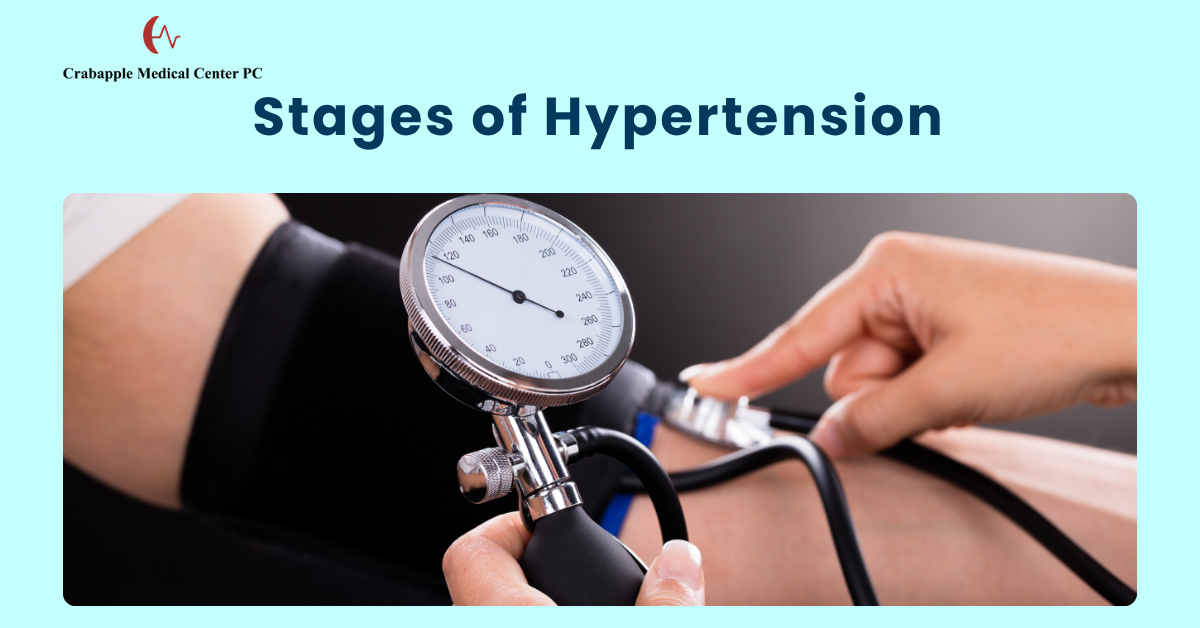Managing Hypertension | Expert Tips from Crabapple’s Primary Care Experts
Hypertension, often called the “silent killer,” is one of the most common health issues in the United States, affecting nearly one-third of adults. In Alpharetta, GA, where a large portion of the population leads busy, high-stress lives, understanding and managing high blood pressure is crucial to maintaining long-term health.
Hypertension is a condition where the blood pressure in the arteries is consistently elevated. Without proper management, hypertension can lead to serious health complications, such as heart disease, stroke, kidney damage, and other cardiovascular problems. However, with the right treatment, lifestyle changes, and support from healthcare professionals, hypertension can be controlled effectively.
At Crabapple Medical Center in Alpharetta, GA, our team of experts provides personalized care and helps you manage your hypertension. In this blog, we will discuss the importance of managing hypertension, its causes, complications, and offer expert tips on how to effectively control it, based on the advice from our primary care specialists.
What is Hypertension?
Hypertension, or high blood pressure, occurs when the force of the blood against the artery walls is too high. Blood pressure is measured in millimetres of mercury (mmHg) and is recorded with two numbers: systolic and diastolic. The systolic pressure (the first number) measures the pressure in your arteries when your heart beats. The diastolic pressure (the second number) measures the pressure in your arteries when your heart is resting between beats.
A normal blood pressure reading is generally considered to be less than 120/80 mmHg. If your blood pressure readings consistently range from 130/80 mmHg or higher, it is classified as hypertension.

Stages of Hypertension
- Normal Blood Pressure: Systolic pressure less than 120 and diastolic pressure less than 80.
- Prehypertension: Systolic between 120-139 or diastolic between 80-89.
- Stage 1 Hypertension: Systolic between 140-159 or diastolic between 90-99.
- Stage 2 Hypertension: Systolic of 160 or higher or diastolic of 100 or higher.
Common Causes of Hypertension
Hypertension may develop due to a variety of factors, which can include:
- Genetics: Family history plays a significant role in the development of hypertension. If your parents or close relatives have high blood pressure, you are more likely to develop it.
- Obesity: Being overweight or obese increases the risk of developing high blood pressure. Extra weight puts a strain on your heart and increases blood flow.
- Lack of Physical Activity: Physical inactivity contributes to weight gain and increases the risk of hypertension.
- High Salt Intake: Consuming too much salt in your diet can cause the body to retain water, increasing blood pressure.
- Stress: Chronic stress can contribute to high blood pressure by causing your body to produce hormones that temporarily raise blood pressure.

Risk Factors for Hypertension in Alpharetta
Alpharetta, like many suburban areas, faces its own set of unique challenges that can contribute to hypertension. A high percentage of the population works in high-stress corporate jobs, and many individuals struggle with maintaining a balanced lifestyle. In addition, the region’s rich food culture and sedentary lifestyle habits also contribute to high blood pressure rates. As a result, regular checkups and preventative care are critical in reducing hypertension-related complications.
How Hypertension Impacts Your Health?
- Link Between Hypertension and Heart Disease
One of the most serious complications of untreated hypertension is heart disease. High blood pressure causes the heart to work harder than normal, which can lead to the thickening of the heart muscle. Over time, this can result in heart failure, a condition where the heart is unable to pump blood effectively. Hypertension also damages the blood vessels, making them less flexible and increasing the risk of blockages that can lead to heart attacks.
- Stroke and Kidney Damage
Hypertension is a leading cause of strokes. Elevated blood pressure damages blood vessels in the brain, increasing the risk of rupture or clotting, which can lead to a stroke. Similarly, high blood pressure can damage the kidneys over time, leading to chronic kidney disease or kidney failure.
Importance of Early Detection
Since hypertension is often asymptomatic in its early stages, it is crucial to have regular blood pressure screenings. If left untreated, hypertension can cause significant health damage before symptoms even appear. Monitoring blood pressure regularly allows for early intervention, which can help prevent or delay the onset of complications.
Tips for Managing Hypertension
1. Adopt a Heart-Healthy Diet
A diet rich in fruits, vegetables, whole grains, lean proteins, and low-fat dairy is essential for lowering blood pressure. The DASH (Dietary Approaches to Stop Hypertension) diet is one of the most effective eating plans for managing hypertension. It emphasizes:
- Fruits and Vegetables: Aim for 4-5 servings of fruits and vegetables daily.
- Low-Fat Dairy: Choose low-fat or fat-free dairy products to reduce saturated fat intake.
- Whole Grains: Incorporate whole grains like oats, brown rice, and whole wheat into your meals.
- Lean Protein: Include lean protein sources such as chicken, fish, beans, and nuts.
- Reduce Salt: Limit sodium intake by cutting back on processed foods and using less salt in cooking.

2. Exercise Regularly
Physical activity helps lower blood pressure by improving heart health and increasing blood vessel flexibility. According to the American Heart Association, aim for at least 30 minutes of moderate-intensity exercise on most days of the week. Activities like walking, swimming, cycling, and jogging are excellent choices for improving cardiovascular health.
3. Manage Stress
Chronic stress contributes to hypertension by increasing the release of stress hormones that temporarily elevate blood pressure. To manage stress:
- Practice Relaxation Techniques: Deep breathing, yoga, meditation, and mindfulness exercises can help reduce stress and lower blood pressure.
- Limit Caffeine: Excessive caffeine can increase blood pressure, so it’s important to limit coffee and other caffeinated beverages.
4. Maintain a Healthy Weight
Carrying extra weight puts additional strain on the heart and increases the risk of high blood pressure. Losing even a small amount of weight can make a significant difference in controlling hypertension. If you’re overweight or obese, talk to your primary care provider about a weight loss plan that’s right for you.
5. Limit Alcohol and Smoking
Both alcohol and smoking can raise blood pressure and lead to other cardiovascular issues. Limiting alcohol intake to no more than one drink per day for women and two drinks per day for men is recommended. Additionally, quitting smoking can improve overall cardiovascular health and reduce hypertension.
6. Sleep Well
Sleep is essential for managing blood pressure. Poor sleep quality, including sleep apnea, can contribute to high blood pressure. Aim for 7-9 hours of quality sleep each night to promote heart health and manage hypertension effectively.
7. Medication and Treatment
For some people, lifestyle changes alone may not be enough to control hypertension. If your blood pressure remains elevated despite making lifestyle adjustments, your primary care provider may recommend medication. Common classes of medication used to treat hypertension include:
- Diuretics: Help reduce excess fluid in the body.
- ACE Inhibitors: Relax blood vessels and improve blood flow.
- Beta-blockers: Slow the heart rate and reduce blood pressure.
- Calcium Channel Blockers: Help relax blood vessels.
8. Monitor Blood Pressure Regularly
At Crabapple Medical Center, we encourage our patients to monitor their blood pressure regularly. Home blood pressure monitors can help track your blood pressure readings and identify any changes. Regular checkups at our clinic are also important to ensure that your hypertension is under control and that your treatment plan is effective.
Role of Crabapple Medical Center in Hypertension Management
At Crabapple Medical Center, our team of experts provides personalized care to help you manage hypertension effectively. We understand that each patient’s needs are unique, which is why we offer tailored treatment plans to fit your specific lifestyle and health goals.
Comprehensive Blood Pressure Monitoring
Our healthcare providers will regularly check your blood pressure during routine visits to monitor for any changes. If necessary, we may recommend additional testing, such as blood tests or an EKG, to evaluate the health of your heart and kidneys. We will work with you to develop a customized plan that includes lifestyle changes, medication, and regular monitoring.
Ongoing Support and Education
We are committed to empowering our patients with the knowledge and tools they need to manage their hypertension successfully. Through educational resources, workshops, and ongoing support, Crabapple Medical Center strives to create a healthier Alpharetta community, one patient at a time.
When to See a Doctor?
If your blood pressure readings consistently exceed 130/80 mmHg, it’s important to seek medical attention. Additionally, if you experience symptoms such as severe headaches, dizziness, shortness of breath, or chest pain, contact a healthcare professional immediately.
Regular visits to your primary care provider can help you stay on top of your health and catch any changes in your blood pressure early.
Your Health is in Your Hands – Get Started Now
Hypertension is a manageable condition, and with the right lifestyle changes and medical care, you can live a long and healthy life. At Crabapple Medical Center, we provide comprehensive care to help you manage your blood pressure and prevent the complications associated with high blood pressure. Schedule a consultation with us today and take the first step toward better health.
Don’t wait for hypertension to affect your health. Contact Crabapple Medical Center in Alpharetta, GA, today to schedule an appointment and begin managing your blood pressure effectively.
Role of Crabapple Medical Center in Hypertension Management
At Crabapple Medical Center, our team of experts provides personalized care to help you manage hypertension effectively. We understand that each patient’s needs are unique, which is why we offer tailored treatment plans to fit your specific lifestyle and health goals.
Comprehensive Blood Pressure Monitoring
Our healthcare providers will regularly check your blood pressure during routine visits to monitor for any changes. If necessary, we may recommend additional testing, such as blood tests or an EKG, to evaluate the health of your heart and kidneys. We will work with you to develop a customized plan that includes lifestyle changes, medication, and regular monitoring.
Ongoing Support and Education
We are committed to empowering our patients with the knowledge and tools they need to manage their hypertension successfully. Through educational resources, workshops, and ongoing support, Crabapple Medical Center strives to create a healthier Alpharetta community, one patient at a time.
When to See a Doctor?
If your blood pressure readings consistently exceed 130/80 mmHg, it’s important to seek medical attention. Additionally, if you experience symptoms such as severe headaches, dizziness, shortness of breath, or chest pain, contact a healthcare professional immediately.
Regular visits to your primary care provider can help you stay on top of your health and catch any changes in your blood pressure early.
Your Health is in Your Hands – Get Started Now
Hypertension is a manageable condition, and with the right lifestyle changes and medical care, you can live a long and healthy life. At Crabapple Medical Center, we provide comprehensive care to help you manage your blood pressure and prevent the complications associated with high blood pressure. Schedule a consultation with us today and take the first step toward better health.
Don’t wait for hypertension to affect your health. Contact Crabapple Medical Center in Alpharetta, GA, today to schedule an appointment and begin managing your blood pressure effectively.
Frequently Asked Questions
What is Hypertension and How Does it Affect My Health?
Hypertension, or high blood pressure, is a condition where your blood pressure consistently exceeds healthy levels. It can lead to serious health problems like heart disease, stroke, kidney damage, and other cardiovascular issues. Regular monitoring and management are essential to prevent complications.
What Are the Symptoms of Hypertension?
Hypertension often has no symptoms, which is why it’s called the “silent killer.” You may not feel any different even if your blood pressure is high. Regular checkups with your primary care provider are the best way to monitor your blood pressure and catch any changes early.
How Can I Lower My Blood Pressure Naturally?
To lower blood pressure naturally, adopt a healthy diet (like the DASH diet), exercise regularly, manage stress, reduce salt and alcohol intake, and maintain a healthy weight. These lifestyle changes can significantly improve your blood pressure levels.
What Is the DASH Diet, and How Does It Help Hypertension?
The DASH (Dietary Approaches to Stop Hypertension) diet focuses on eating nutrient-rich foods like fruits, vegetables, whole grains, and low-fat dairy. It helps reduce blood pressure by decreasing sodium intake and increasing potassium, calcium, and magnesium.
When Should I See a Doctor for High Blood Pressure?
You should see a doctor if your blood pressure readings consistently exceed 130/80 mmHg. If you experience symptoms such as severe headaches, chest pain, dizziness, or shortness of breath, contact your healthcare provider immediately for advice and treatment.
Can Hypertension Be Managed Without Medication?
In many cases, hypertension can be controlled without medication through lifestyle changes like diet, exercise, and stress management. However, some people may need medication alongside lifestyle adjustments to achieve optimal blood pressure control.
What Are the Treatment Options for Hypertension?
Treatment for hypertension typically involves a combination of lifestyle changes and medications. Your doctor may prescribe diuretics, ACE inhibitors, beta-blockers, or calcium channel blockers depending on your specific needs.
How Often Should I Have My Blood Pressure Checked?
If you are at risk of hypertension or have already been diagnosed, regular blood pressure checks are essential. It’s recommended to have your blood pressure checked at least once a year, or more frequently if you’re managing hypertension or other risk factors.
Can Hypertension Be Prevented?
While you cannot change certain risk factors like family history, you can significantly reduce the risk of hypertension by leading a healthy lifestyle. This includes maintaining a balanced diet, staying physically active, managing stress, avoiding smoking, and limiting alcohol consumption.

